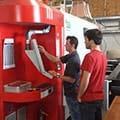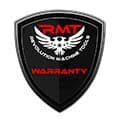Don’t Maintain and Feel the Pain
Your various operator manuals say very clearly that you need to follow the listed schedules of routine maintenance to keep your fabrication machines running at peak performance. Is it really that essential to follow them to the letter, though?
Taking time away from production to perform preventative maintenance often seems like an unnecessary burden. Any point in time chosen for maintenance will feel like the worst possible one for the machine to have downtime—but only until the machine itself picks an even worse time. As a popular sign says, “WARNING — If you don’t schedule time for maintenance, your equipment will schedule it for you.”
The philosophy of “Run it till it breaks” simply isn’t practical. Unless you have a surplus of spare machines sitting idle in your shop, unplanned downtime can be a disaster for your business. Scheduling your maintenance as a preventative measure can greatly reduce reactive maintenance and equipment failure.
Benefits of Following Routine Maintenance Schedules
Preventative maintenance really is essential for metal fabrication machines to ensure their longevity, efficiency, and safety. Key benefits of keeping up with routine maintenance on your shop’s machines include:
- Preventing Unplanned Downtime. Unplanned downtime can be costly for metal fabrication businesses. When a machine breaks down unexpectedly, it can halt production, leading to delays and financial losses. Routine maintenance helps in identifying worn-out parts or components that are nearing the end of their lifecycle. By replacing these parts proactively, businesses can prevent unexpected breakdowns and maintain a consistent production schedule.
- Prolonging Machine Life. Metal fabrication machines like press brakes and plate rolls are substantial investments for any metalworking business. Regular maintenance helps in identifying and addressing potential issues before they become significant problems. For instance, lubrication of moving parts prevents wear and tear, reducing the risk of part failure. By adhering to a routine maintenance schedule, fab shops can maximize the lifespan of their machines, guaranteeing a better return on investment.
- Ensuring Precision and Accuracy. Metal fabrication requires a high degree of precision. Even minor deviations in machine performance can lead to significant errors in the final product. Routine maintenance includes calibrating machines to ensure they are operating within the desired tolerances. This calibration is crucial for maintaining the accuracy of cuts, bends, and other fabrication operations, leading to higher quality products and reduced waste.
- Enhancing Safety. Safety is a paramount concern in any manufacturing environment. Metal fabrication machines, if not properly maintained, can pose significant safety risks to operators. For example, a malfunctioning machine might cause an unexpected movement, leading to potential injuries. Routine maintenance involves checking safety features such as emergency stops, guards, and sensors to ensure they are functioning correctly. This proactive approach minimizes the risk of accidents, protecting operators and reducing liability for the company.
- Improving Efficiency and Performance. Well-maintained machines operate more efficiently. Routine maintenance tasks, such as cleaning, lubricating, and aligning components, ensure that machines run smoothly and without unnecessary friction or resistance. This improved efficiency can lead to faster production times, reduced energy consumption, and lower operating costs. Additionally, machines that are in good working condition are less likely to produce defective parts, further enhancing overall productivity.
- Cost Savings. While routine maintenance involves an upfront cost, it can lead to significant savings in the long run. Preventive maintenance is typically less expensive than emergency repairs or part replacements following a breakdown. Moreover, well-maintained machines are more energy-efficient, leading to lower utility bills. By avoiding costly repairs and reducing energy consumption, fabrication businesses can allocate resources more effectively.
- Meeting the Terms of the Warranty. Manufacturers of metal fabrication machines provide detailed maintenance guidelines to ensure optimal performance. Adhering to these recommendations not only keeps the machines in top condition but also often protects the warranty. Ignoring routine maintenance can void warranties, leaving businesses responsible for the full cost of repairs or replacements.
- Ensuring Compliance with Regulations. Many industries have stringent regulations regarding equipment maintenance and safety. Failure to comply with these regulations can result in fines, legal issues, and reputational damage. Routine maintenance helps businesses stay compliant with industry standards and legal requirements, avoiding these potential pitfalls.
- Supporting Technological Upgrades. As technology evolves, metal fabrication machines often receive software updates or require integration with new systems. Routine maintenance includes updating software, and ensuring that machines are equipped with the latest features and security measures. Adopting such a proactive attitude supports the seamless integration of new technologies, keeping businesses competitive in a rapidly changing industry.
- Building a Culture of Quality. Implementing a routine maintenance program fosters a culture of quality within the organization. It demonstrates a commitment to excellence and attention to detail, which can positively impact employee morale and customer perception. When workers see that the company prioritizes the upkeep of equipment, they can be more likely to take pride in their work and contribute to a high-quality production environment.
Consider a Preventative Maintenance Contract
Many machinery service providers will offer preventative maintenance contracts to their customers that can be customized to specific needs and budgets. Having regularly scheduled visits from service professionals can give you the peace of mind that comes from knowing that industry experts are checking and adjusting your key machines.
Whether you outsource it or perform it inhouse, investing in routine maintenance is not just a preventative measure—it is a strategic approach to optimizing operations, safeguarding investments, and ensuring the long-term success of your metal fabrication business.







